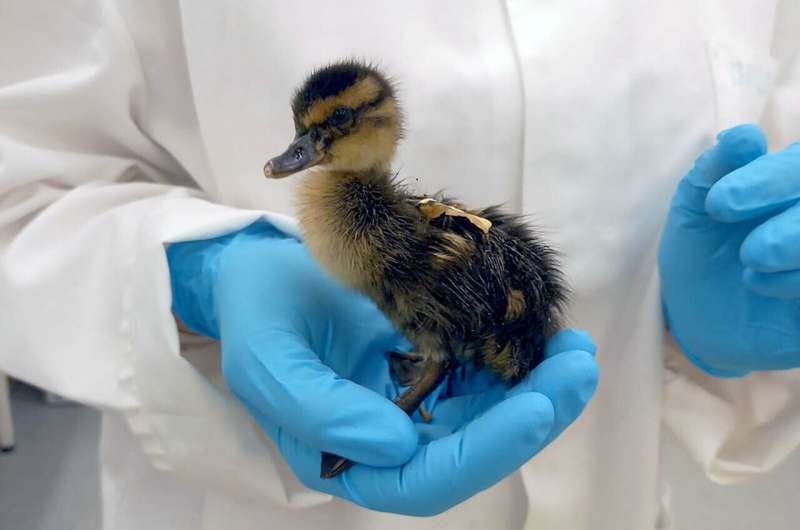Science
EU Considers Ban on PFAS After Gene Alterations in Ducklings

The European Union is contemplating a comprehensive ban on man-made chemicals known as PFAS, as new research indicates these substances can alter the genes of ducklings even before they hatch. These chemicals, often referred to as “forever chemicals,” are notorious for their slow breakdown in the environment and have been linked to various health risks.
Research conducted by the Norwegian University of Science and Technology (NTNU) reveals alarming effects of PFAS on wildlife. According to Anne-Fleur Brand, a former Ph.D. research fellow at NTNU, PFAS are pervasive in everyday products, including frying pans, waterproof clothing, food packaging, and firefighting foam. Their widespread use has led to contamination in drinking water and even in ski tracks, as these chemicals were once utilized in ski wax.
The study, published in the journal Environmental Toxicology and Chemistry, focused on the effects of two new PFAS compounds found in wild duck eggs. Professor Veerle Jaspers, who led the research, explained that the controlled laboratory experiments aimed to determine how these chemicals affect the developing embryos of mallard ducks.
Investigating the Impact of PFAS on Ducklings
The researchers injected mallard duck eggs with either one of the two newly identified PFAS chemicals or with PFOS, a previously banned compound known for its toxicity. This method simulated the natural transfer of chemicals from mother to egg. After sealing the eggs, they were incubated for four weeks until the ducklings hatched.
Once hatched, the team collected samples from three critical organs: the liver, heart, and bursa fabricii, a unique organ in birds essential for immune development. The results revealed significant changes in gene expression, indicating that exposure to these chemicals can have profound implications for the health of the ducklings.
In particular, the liver showed altered genes responsible for fat metabolism. Brand noted that this could severely impact the ducks’ ability to survive and reproduce since mallard ducks rely on fat storage aligned with their breeding and migration cycles.
Uncertain Effects on Immune Response
Interestingly, while the heart remained largely unaffected, the bursa fabricii exhibited increased activity in a gene typically associated with viral infection detection. This raises questions about whether the ducks are better prepared to combat infections or if their immune systems are under unnecessary stress.
The researchers stressed the importance of further studies to monitor the ducklings as they develop, particularly in relation to their resilience against viruses such as bird flu, which poses a significant threat to wild bird populations.
The findings underscore the need for regulatory action on PFAS. Jaspers emphasized that the EU’s consideration of regulating all PFAS as a group, rather than individually, is critical. “Our research supports the call to manage all forms of PFAS collectively due to their similar chemical structures and potential dangers,” he stated.
As the evidence mounts regarding the long-term consequences of forever chemicals, the researchers advocate for caution. “Forever chemicals do not just have long-term consequences. They are a problem right from the very beginning of life,” they concluded in their article.
The implications of this research extend beyond wildlife, as the potential health risks to humans and the environment continue to be a pressing concern in regulatory discussions. The growing body of evidence indicating harmful effects on various species highlights the urgent need for comprehensive policies to address the widespread use of PFAS.
-

 Top Stories1 month ago
Top Stories1 month agoRachel Campos-Duffy Exits FOX Noticias; Andrea Linares Steps In
-

 Entertainment18 hours ago
Entertainment18 hours agoJayda Cheaves Claims Lil Baby and Ari Fletcher Had an Affair
-

 Top Stories2 weeks ago
Top Stories2 weeks agoPiper Rockelle Shatters Record with $2.3M First Day on OnlyFans
-

 Top Stories2 weeks ago
Top Stories2 weeks agoMeta’s 2026 AI Policy Sparks Outrage Over Privacy Concerns
-

 Sports2 weeks ago
Sports2 weeks agoLeon Goretzka Considers Barcelona Move as Transfer Window Approaches
-

 Top Stories2 weeks ago
Top Stories2 weeks agoUrgent Update: Denver Fire Forces Mass Evacuations, 100+ Firefighters Battling Blaze
-

 Health2 months ago
Health2 months agoTerry Bradshaw Updates Fans on Health After Absence from FOX NFL Sunday
-

 Top Stories2 weeks ago
Top Stories2 weeks agoOnlyFans Creator Lily Phillips Reconnects with Faith in Rebaptism
-

 Sports1 week ago
Sports1 week agoSouth Carolina Faces Arkansas in Key Women’s Basketball Clash
-

 Top Stories1 week ago
Top Stories1 week agoCBS Officially Renames Yellowstone Spin-off to Marshals
-

 Top Stories2 weeks ago
Top Stories2 weeks agoOregon Pilot and Three Niece Die in Arizona Helicopter Crash
-

 Entertainment2 weeks ago
Entertainment2 weeks agoTom Brady Signals Disinterest in Alix Earle Over Privacy Concerns




